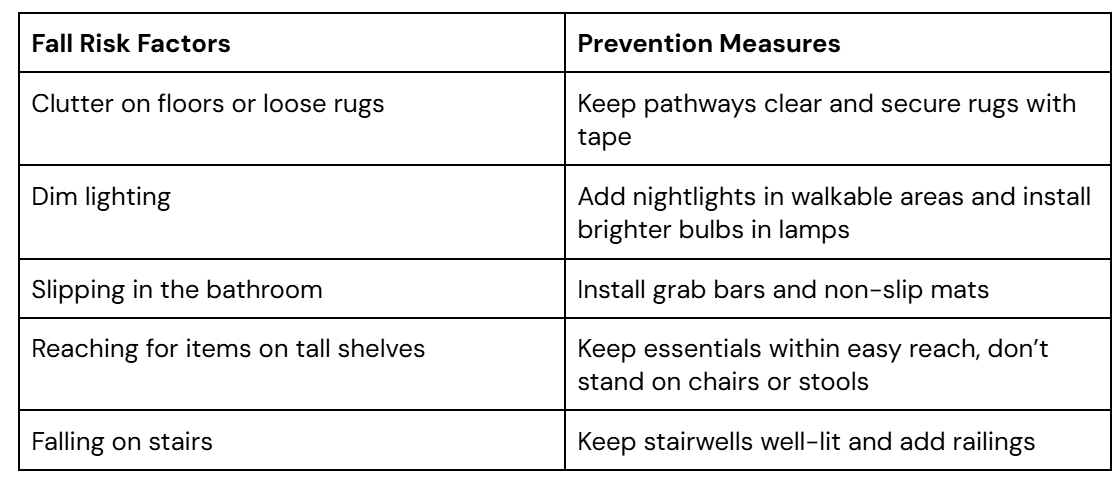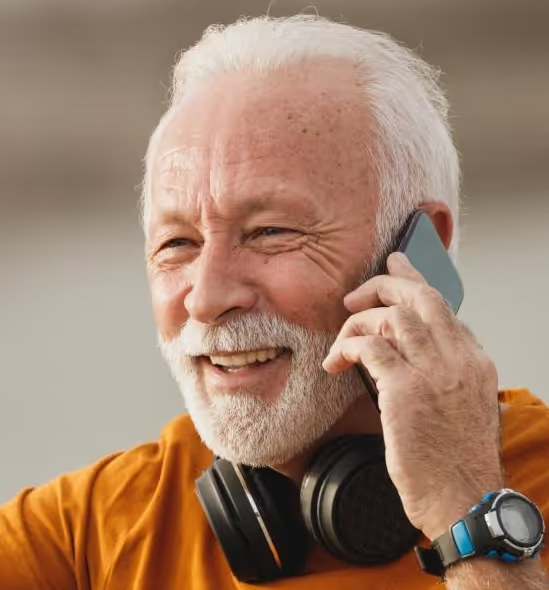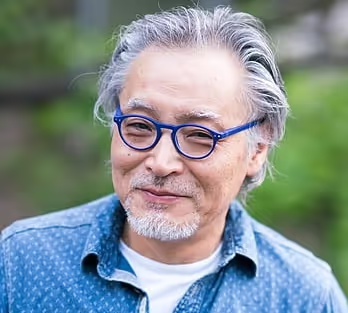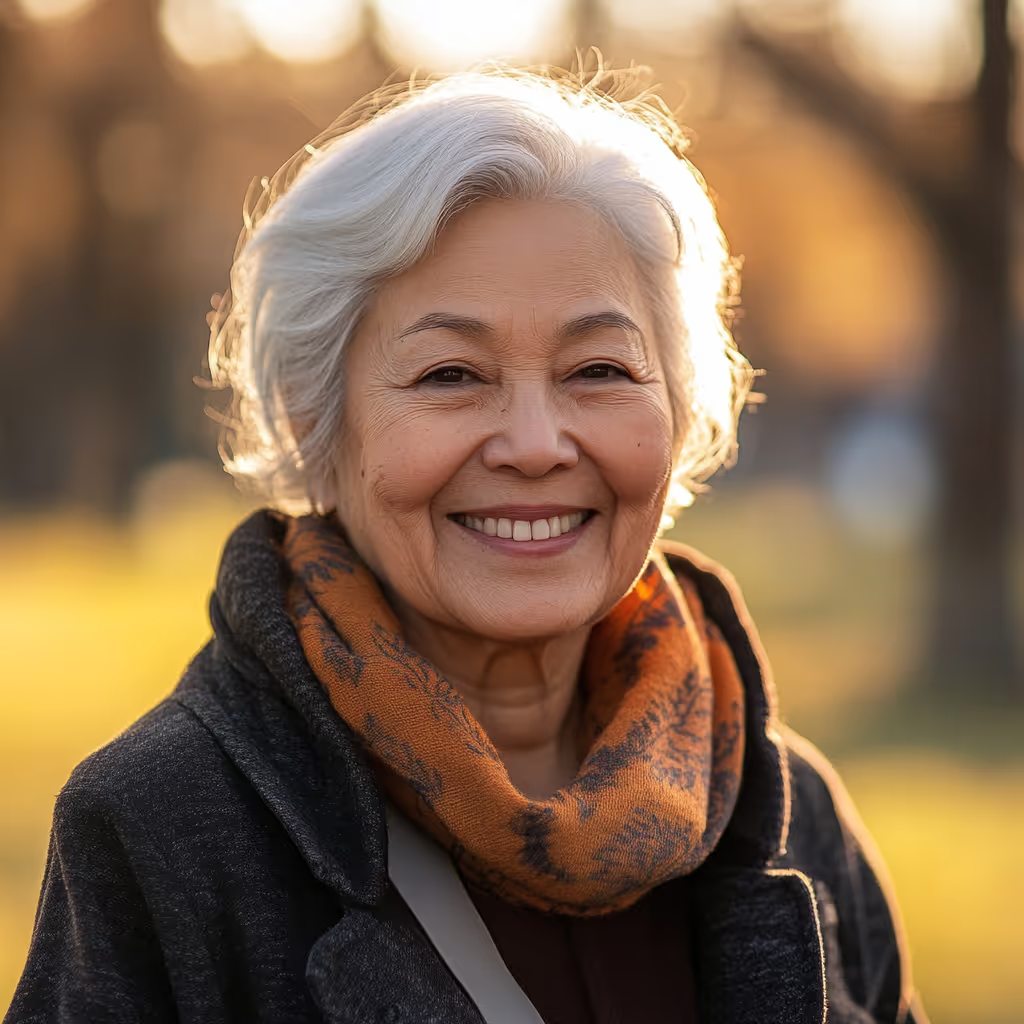
When you hear the word “aging,” you might think of limited time and facing more challenges. But aging, or rather, proactive aging, isn’t about slowing down, or even trying to stop the changes that come with getting older. Instead, healthy aging focuses on supporting healthy energy and well-being by practicing self-care.
Self-care for seniors is about taking an active role in your physical and mental health. Being intentional about these practices helps you maintain your independence and quality of life.
Key Takeaways
- Self-care for seniors is about intentional daily practices that strengthen your body, mind, and spirit.
- By starting with a few small self-care practices each day, you can build a lifelong habit of self-care.
- Overcome barriers to self-care by seeking out support and assistance for what you need to succeed.
12 essential self-care strategies for seniors
The following are 12 practical self-care tips to improve your physical health and emotional health every day.
1. Regular low-impact exercise and balance training
If the idea of “working out” sounds overwhelming, it can help to understand that even gentle movement throughout the day can help maintain your strength, flexibility, and balance. Any physical activity you get is better than none at all.
The CDC says ideally, older adults over age 65 should get 30 minutes of moderate exercise five days a week for better overall health. Start slow and build from there.
Here are some ideas to try:
- Short walks: Start out with short, 10-minute walks at your own pace. You can walk outside for some fresh air. If the weather isn’t ideal, even walking around your home counts as exercise.
- Chair yoga: Chair yoga is a way to practice yoga if you have mobility and balance concerns. It can help build strength and increase your flexibility. Research shows that yoga can be just as helpful as strength training or stretching for improving your everyday movements and activities.
- Tai chi: Tai chi involves slow, flowing movements that can help improve your balance and calm your mind. It’s a traditional Chinese medicine practice that is low-impact and safe to do in your home.
2. Eat a balanced, nutrient-dense diet
A well-balanced diet is key. Focus your nutrition on:
- Plenty of colorful fruits and vegetables
- Lean proteins like chicken or turkey, fish, eggs, and beans
- Whole grains such as whole wheat bread, brown rice, and oats
- Foods high in calcium, like yogurt and leafy green vegetables
It might be easier for you to eat smaller, more frequent meals rather than three larger ones. Add healthy snacks throughout the day if you aren’t eating enough. Eating a well-balanced diet can also help keep your immune system strong, protecting you against illness.
Meal planning, such as freezing meals for later or getting meals from a service like Meals on Wheels, can help address meal preparation concerns.
3. Drink enough fluids
Dehydration is common in older adults because the sense of thirst diminishes with age. The National Council on Aging (NCOA) says up to 40% of older adults aren’t drinking enough water.
Aim for about 9–13 cups of water a day (but adjust this based on your healthcare provider’s advice). You can also eat foods high in water content, like:
- Celery
- Cucumbers
- Romaine lettuce
- Green grapes
- Peaches
- Corn
4. Get a good night’s sleep
Many seniors struggle with poor sleep. Older adults often get less deep sleep, which is the restorative sleep your body needs to rest and repair itself. You may find it harder to fall or stay asleep, and might have lighter sleep that’s more easily interrupted.
Here are some tips for better sleep hygiene:
- Sleep in a cool, dark, and quiet room
- Use a fan or white noise to help block out distracting noises
- Try not to eat too close to bedtime
- Limit water intake before bed to reduce bathroom trips
- Create a relaxing bedtime routine, such as taking a warm bath, reading a book, or spending time in quiet reflection
- Go to bed and wake up at the same time each day
5. Mental stimulation
Your brain is just as important to exercise as your muscles. Keeping your mind active helps prevent decline in your thinking and memory. Cognitive health is key to your overall health and quality of life.
Stimulate your mind and protect cognitive function by:
- Learning new skills
- Putting together puzzles
- Write
- Play games like chess or Sudoku
- Do arts and crafts
6. Social engagement and support
According to the 2017 Health and Retirement Study, adults over age 65 who spent a lot of time visiting neighbors and volunteering had better cognitive function in their later years.
Here are some ideas to help you stay connected with others:
- Join a club geared toward other older adults
- Have phone or video calls with family
- Join an intergenerational program (programs that connect younger people with older people to decrease stereotypes and encourage community)
7. Mindfulness and stress management
Practicing mindfulness as you age can reduce stress, boost your mental health, and even lower levels of inflammation in your body, according to a 2019 study in the journal BMC Geriatrics.
Some ways you can practice mindfulness (which is a term for being present in the moment) include:
- Relaxation techniques like breathing exercises
- Gentle yoga
- Guided meditation using apps or programs
- Meditation while walking or sitting outside
8. Maintaining a safe home environment
Making a few small modifications to your home can help you maintain your independence and confidence.
Creating a safe home can prevent falls and other accidents. Falls are the leading cause of death and injury to adults over age 65, according to the CDC.
The following are factors that can put you at risk of falling, along with ways to prevent them.

9. Pursuing hobbies and purpose
Try an activity you enjoy, or pick up a hobby or one you used to love. This might be knitting, gardening, playing an instrument, or even taking a class to learn something new. Not only can a new hobby be fun, but it can also help you meet others with similar interests.
Other activities can give you renewed purpose in the retirement years. Maybe you were a teacher or a veterinarian. Put those skills to use by volunteering your time or mentoring youth.
10. Technology for connection and health
Using technology can make things safer for you or your loved one and provide convenience and entertainment.
Some useful ways to use technology include:
- Telehealth appointments for doctor visits and mental health therapy sessions
- An app on your phone for medication reminders
- Fitness trackers, like a watch to monitor your steps and heart rate
- A medical alert device, like a necklace or watch, to alert for help if you fall or are injured
- Video calling platforms like Zoom or FaceTime to stay connected with family or friends
11. Preventive healthcare and screenings
Regular check-ups with your healthcare provider can help catch health concerns early before they become more serious. To continue to feel your best, don’t skip:
- Yearly physicals or scheduled check-ins with your healthcare provider
- Dental exams
- Vision and hearing appointments
- Screenings for blood pressure, cholesterol, diabetes, and other health conditions
- Recommended cancer screenings
- Recommended vaccines, such as flu shot, shingles, or pneumonia
12. Emotional and spiritual well-being
It’s also important to care for your emotional and spiritual well-being. Being religious might mean the same as being spiritual, but you can also be spiritual without being religious.
Maintain your faith practices if they bring you comfort. If transportation to your place of worship is challenging, many places have volunteers who drive older adults to services.
You can also try other practices such as:
- Journaling
- Practicing relaxation strategies
- Spending time outdoors
- Coping with stress in a healthy way, such as talking with a mental health professional
Building a daily self-care routine
Being consistent can help build long-term healthy habits to nurture your self-care. Keep things simple when you’re first starting out. Choose two or three of the 12 self-care habits to begin with.
For example, here’s a sample routine you might work into your day:
- Morning: Wake up, do some gentle stretches, eat a healthy breakfast, and take a few deep breaths to start the day.
- Midday: Take a short walk for physical activity, then have a nutritious lunch with a friend.
- Afternoon: Read a book or spend time doing a hobby you enjoy.
- Evening: Have a light dinner, listen to some relaxing music, and begin your bedtime routine.
Overcoming common barriers
Even when you have good intentions, sometimes there can be barriers or challenges that make self-care more difficult.
If you are struggling with motivation, start small. Aim to spend just five or ten minutes on a puzzle you want to finish. Or step outside onto your patio and enjoy the sunshine.
When mobility issues are a concern, you can sit to do gentle exercises or stretching. You might be referred to an occupational therapist who can problem-solve ways to maintain or improve your physical activity level.
If technology feels intimidating, ask a friend or family member to show you how to use a device or app. Your local library or senior center may also offer classes or help with using technology.
How Sailor Health supports senior mental health
Practicing daily self-care can take some time and patience, but caring for yourself will help you live a happier and more fulfilling life. It can also keep you independent for as long as possible.
Start with a few self-care practices and build healthy habits from there. Seek help if you need some extra emotional support along the way.
If you’re an older adult struggling with your mental health, Sailor Health can help. We offer telehealth via computer, phone, or even landline. Plus, most Medicare patients have a $0 copay. We’re here to help you embrace aging and take care of your mental health along the way. Call us today to get started.
Frequently Asked Questions
What is self-care for the elderly?
For older adults, self-care means making intentional choices each day to support physical, mental, emotional, and social well-being. Self-care helps you stay independent and enjoy life.
What should a 70-year-old be doing every day?
A 70-year-old can improve physical health and mental health by doing the following daily:
- Balance a routine of 30 minutes of moderate exercise (walking, gardening)
- Strength/balance exercises twice weekly
- Practice mental activities (puzzles, reading)
- Social interaction (calls, clubs)
- Eat nutrient-dense meals
- Hydrate
- Get 7–8 hours of sleep
- Take daily mindfulness breaks
What do seniors need the most?
To live life to the fullest, seniors need accessible healthcare, meaningful social connections, a sense of purpose, a safe environment, proper nutrition, and financial security.
How many minutes should a 70-year-old walk a day?
Aim for at least 150 minutes of moderate aerobic activity per week, like walking, cycling, or swimming. This equals about 30 minutes a day, five days a week. Split these 30 minutes into smaller sessions if needed.
References
- Holt-Lunstad J. (2024). Social connection as a critical factor for mental and physical health: evidence, trends, challenges, and future implications. World Psychiatry: Official journal of the World Psychiatric Association (WPA), 23(3), 312–332. https://pmc.ncbi.nlm.nih.gov/articles/PMC11403199/
- Centers for Disease Control and Prevention (CDC). (2023). Older Adult Activity: An Overview. https://www.cdc.gov/physical-activity-basics/guidelines/older-adults.html
- CDC. (2024). Physical Activity Benefits for Adults 65 or Older. https://www.cdc.gov/physical-activity-basics/health-benefits/older-adults.html
- National Institute on Aging. (2023). How the Aging Brain Affects Thinking. https://www.nia.nih.gov/health/brain-health/how-aging-brain-affects-thinking
- National Academies of Sciences, Engineering, and Medicine. (2020). Social Isolation and Loneliness in Older Adults: Opportunities for the Health Care System. https://www.ncbi.nlm.nih.gov/books/NBK557972/
- CDC. (2024). What You Can Do to Meet Physical Activity Recommendations. https://www.cdc.gov/physical-activity-basics/guidelines/index.html
- Gothe, N. P., & McAuley, E. (2015). Yoga Is as Good as Stretching–Strengthening Exercises in Improving Functional Fitness Outcomes: Results From a Randomized Controlled Trial. The Journals of Gerontology Series A: Biological Sciences and Medical Sciences, 71(3), 406. https://doi.org/10.1093/gerona/glv127. https://pmc.ncbi.nlm.nih.gov/articles/PMC5864160/
- Yang, C., Desai, A. B., Esfahani, P., Sokolovskaya, T. V., & Bartlett, D. J. (2021). Effectiveness of Tai Chi for Health Promotion of Older Adults: A Scoping Review of Meta-Analyses. American Journal of Lifestyle Medicine, 16(6), 700. https://doi.org/10.1177/15598276211001291. https://pmc.ncbi.nlm.nih.gov/articles/PMC9644143/
- Medline Plus. (2024). Nutrition for Older Adults. https://medlineplus.gov/nutritionforolderadults.html
- Medline Plus. (n.d.). Aging changes in sleep. https://medlineplus.gov/ency/article/004018.htm
- National Institute of General Medical Sciences. (2023). Circadian Rhythms. https://www.nigms.nih.gov/education/fact-sheets/Pages/circadian-rhythms
- Park, D. C., Lodi-Smith, J., Drew, L., et al. (2013). The Impact of Sustained Engagement on Cognitive Function in Older Adults: The Synapse Project. Psychological Science, 25(1), 103. https://doi.org/10.1177/0956797613499592. https://pmc.ncbi.nlm.nih.gov/articles/PMC4154531/
- Park, S., Kwon, E., & Lee, H. (2017). Life Course Trajectories of Later-Life Cognitive Functions: Does Social Engagement in Old Age Matter? International Journal of Environmental Research and Public Health, 14(4), 393. https://doi.org/10.3390/ijerph14040393. https://pmc.ncbi.nlm.nih.gov/articles/PMC5409594/
- Giraudeau, C., & Bailly, N. (2019). Intergenerational programs: What can school-age children and older people expect from them? A systematic review. European Journal of Ageing, 16(3), 363–376. https://doi.org/10.1007/s10433-018-00497-4. https://pmc.ncbi.nlm.nih.gov/articles/PMC6728408/
- Parra, D.C., Wetherell, J.L., Van Zandt, A. et al. A qualitative study of older adults’ perspectives on initiating exercise and mindfulness practice. BMC Geriatr 19, 354 (2019). https://doi.org/10.1186/s12877-019-1375-9. https://bmcgeriatr.biomedcentral.com/articles/10.1186/s12877-019-1375-9
- Djernis, D., Lundsgaard, C. M., Rønn-Smidt, H., & Dahlgaard, J. (2023). Nature-Based Mindfulness: A Qualitative Study of the Experience of Support for Self-Regulation. Healthcare (Basel, Switzerland), 11(6), 905. https://doi.org/10.3390/healthcare11060905. https://pmc.ncbi.nlm.nih.gov/articles/PMC10048623/
- CDC. (2024). Older Adult Falls Data. https://www.cdc.gov/falls/data-research/index.html
Frequently Asked Questions
What is Sailor Health?

Sailor Health is a premium mental health service designed specifically for older adults. We connect seniors with licensed therapists who specialize in geriatric care, offering personalized therapy to address issues like anxiety, depression, and the challenges of aging.
Our services are accessible through secure online or phone-based sessions, making it easy for you to receive care from the comfort of their homes.
Is Sailor Health covered by insurance?

Yes, Sailor Health is in-network with Medicare and many Medicare Advantage plans, making our services accessible and affordable for our clients. We believe that mental health care should be within reach for everyone, so we work hard to ensure that our services are affordable but exceptional.
What if my loved one isn’t comfortable with technology?

We understand that technology can be intimidating for some older adults. Studies show that many older adults actually find online therapy more comfortable and convenient once they try it, with clinical outcomes comparable to in-person therapy.
Seniors can join therapy sessions with a simple video link or a phone call (no smart phone required). We offer step-by-step guidance and are available to help with any technical issues, ensuring that technology doesn’t stand in the way of receiving quality therapy.
How do I know if a therapist is the right fit for me?

We carefully match you with a therapist based on your preferences and needs. To help you feel confident in your choice, we offer a consultation to discuss your goals and preferences. If it’s not the right fit, we’ll work with you to find a therapist who is.
How do you ensure privacy and confidentiality?

Privacy and confidentiality are cornerstones of our service at Sailor Health. We use secure, HIPAA-compliant platforms for all telehealth sessions, ensuring that your personal information and the details of your therapy are kept strictly confidential. Our therapists adhere to professional ethical standards, and we have rigorous data protection measures in place to safeguard your privacy at all times.
About the author

Risa Kerslake

%20(390%20x%20424%20px).avif)


.avif)
%20(390%20x%20424%20px)%20(400%20x%20400%20px).avif)
%20(390%20x%20424%20px)%20(400%20x%20400%20px).avif)

%20(390%20x%20424%20px)%20(400%20x%20400%20px).avif)
%20(390%20x%20424%20px).avif)






